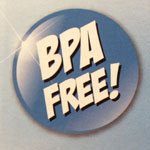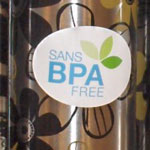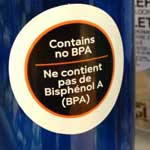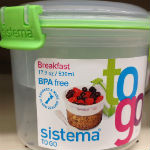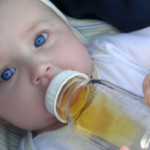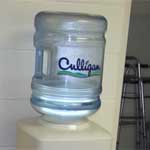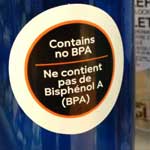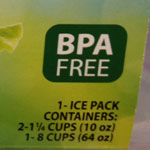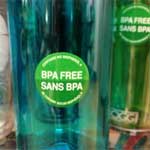"BPA-Free, Here We Go Again!" By Steve Hentges. The headline almost jumps out at you – “BPA Substitute Could Cause Adverse Pregnancy Outcomes.” That alarming headline appears in an industry publication, but the same story was widely reported in the popular media, which tends to cover science only when they can create scare stories. The article reports the results of a new study from a group of Chinese researchers on health effects associated with a substance named fluorene-9-bisphenol (BHPF), … [Read more...]
Safe Levels of BPA in Seafood
"BPA In Seafood - Is It Safe?" By Steve Hentges. It’s not hard these days to find stories in the popular media about the presence of various chemical contaminants in our environment. Included in this genre are stories about trace levels of chemicals in common consumer products, in the air we breathe, and in the water we drink. Almost inevitably the stories suggest that even minor exposures are harming our health. Making it worse, the consumer media is famous for producing scare stories that are … [Read more...]
Really Fake News: Chemical Scares
"The 'Fake News' Problem: Health and Safety Edition," By Angela Logomasini, Ph.D. The moniker “fake news” may have entered the mainstream lexicon in 2016, but phony and misleading news stories have always been a problem—and it’s a phenomenon that doubtless will continue so long as the news media continues disguising political opinion as objective fact. Consider the myriad alarmist news stories this past year hyping risks about chemicals. Read more. Save Save Save … [Read more...]
BPA Exposure During Pregnancy
"Should Pregnant Women Be Concerned About BPA?" By Steve Hentges. A recent study from French government researchers reported new results on the exposure of pregnant women to more than 100 substances that might be a concern for the health of a developing fetus. The study examined exposure to various metals (e.g., lead, mercury, arsenic) and many common organic compounds that we might encounter in our daily lives. Included in the study was bisphenol A (BPA), which is used primarily as a building … [Read more...]
Battling Misinformation About Consumer Products
"Six Products Battling Misinformation," By The Center for Accountability in Science Team. Earlier this month, Safer Chemicals, Healthy Families warned against Six Products to Avoid Whenever Possible. Despite admonishing “scare-tactic click bait headlines that throw parents into a panic,” the author proceeded to write just that. So, in the interest of setting the record straight, we present: Six Products Battling Misinformation. Read more. Save Save Save … [Read more...]
Misleading BPA Warning Labels on Canned Food
"WARNING: BPA Warning Labels Threaten Public Health," By Angela Logomasini, Ph.D. The state of California has extended an emergency rule that allows companies to wait until January 2017 before placing a warning on the label of food packaging containing the chemical Bisphenol A. Supposedly, BPA poses a health risk that demands this warning label, under California’s Proposition 65 law. Rather than place the warning label on the packaging, stores must post signs that BPA may pose health risks and … [Read more...]
BPA Safety Standard Confirmed, Again
"The European Food Safety Authority has Looked Again… and Confirms: No Need to Change the Safety Threshold for BPA," By BPACoalition.org. “Saying something, is one thing; proving it is another” The European Food Safety Authority (EFSA) recently conducted a review of two studies on BPA, and confirmed that there is no need to change the safety threshold for BPA. The former conclusion remains valid: BPA doesn’t pose any risks for health, at levels we’re incidentally exposed to in our daily lives. … [Read more...]
Misleading BPA-Free Labels
"BPA-Free, With Regrets," By Steve Hentges. Not that many years ago, many reusable food and beverage containers on the market worldwide were made from polycarbonate plastic. Polycarbonate, which is made from bisphenol A (BPA), is an almost ideal material for these products since its clarity is comparable to glass, making it easy to see what’s inside, and it’s virtually shatter-proof – an important attribute for consumer products that could be dropped. For years though, BPA has attracted … [Read more...]
BPA Is Everywhere or Not
"BPA Is Everywhere, Except Where It’s Not," By Steve Hentges. With the high level of attention to bisphenol A (BPA) over the years, it’s easy to get the impression that BPA is everywhere and we’re constantly being exposed to high and harmful levels in our daily lives. You might even have seen BPA referred to as an “everywhere chemical.” Adding to the confusion, the media is notorious for attaching pictures of products that contain absolutely no BPA to articles about BPA. Perhaps the most common … [Read more...]
It’s Time to End Taxpayer-Funded Junk Science
"Checks And Balances Are Critical To Public Health," By Jeff Stier. Congressional oversight of executive branch agencies is a key element of the checks and balances that prevent accumulation of too much power, as well as abuse of that power, in any one part of government. A review of two recent congressional oversight endeavors now being stymied by the Obama Administration underscores the often-overlooked importance of the oversight process. In both cases, lives are at stake. The first instance … [Read more...]
Safer than Soy: BPA’s Low Risk Belies Common Beliefs
"Mind The (Risk Perception) Gap On BPA," By Steve Hentges. It is commonly perceived that natural chemicals are safe while manmade substances may be harmful. These perceptions, however, if not supported by scientific evidence, can result in risk perception gaps that can cause us to worry more than warranted by the evidence. A current example of a risk perception gap is the common belief that naturally occurring chemicals known as isoflavones, which are present at significant levels in some … [Read more...]
Misleading Prop 65 Labeling Regulations
"Overregulation Doesn’t Even Spare HIV Patients," By Gregory T. Angelo. This month, the list of substances subject to California’s Proposition 65 was expanded to include Bisphenol-A (BPA), a trace ingredient in many plastics that the scientific community has deemed safe in small amounts.As with other products that include substances deemed cancer-causing under Prop. 65, products that include BPA will now have to carry a warning label stating that they are “known to the state of California to … [Read more...]
Too Much Media Alarmism on BPA
"Too Much BPA?, ByThe Center for Accountability in Science Team. A study published in Environmental Research last week fanned the flames of anti-chemical activists when it drew a link between canned food consumption and the presence of increased levels of Bisphenol-A (BPA) in the urine. The study itself isn’t what we take issue with. In fact, it brought together some of the brightest minds at Stanford, Johns Hopkins, and Columbia Universities. Their research was thorough, encompassing over … [Read more...]
Message to Harris Teeter: Ignore Alarmists
"Dear Harris Teeter Manager: Normal Moms Don’t Believe Chemicals Are Evil," By Julie Gunlock. Dear Harris Teeter Manager, I heard you got harassed the other day. I know this because last week I received an email from a group called Safer Chemicals, Healthy Families (SCHF). The group’s name might not be very creative, but they are effective at reaching moms with their overwrought claims that affordable food and everyday products are destroying the earth and threatening human health. The SCHF … [Read more...]
BPA’s Alleged Impact on Teeth
"Study on BPA and Hypermineralisation Makes us Almost Drop our Teeth," By BPA Coalition. Medical Research (INSERM) presented a study at the 18th European Congress of Endocrinology claiming that exposure to Bisphenol A (BPA) could weaken teeth development in children. More specifically they link BPA exposure to Molar Incisor Hypermineralisation (MIH); it affects 18% of young children between 6 and 9, as their permanent first molars and incisors are more sensitive and prone to cavities. While the … [Read more...]
Plastics Alarmism
"Calling TIME Out on Plastic Alarmism," By The Center for Accountability in Science Team. There’s no shortage of news reports and websites with scary messages about chemicals, but two articles this week caught our attention. First, TIME magazine engaged in a bit of click-baiting this week with a health article warning about common plastics: “That Plastic Container You Microwave In Could Be Super-Toxic.” Next, an article at the Philadelphia Inquirer’s website, although written by two Ph.D.’s, … [Read more...]
Another Flawed BPA Rat Study
"A Study is Rotten in the State of Denmark, and Here’s Why," by Josh Bloom. We need another BPA study like we need root canal. For many years, hundreds (thousands?) of them have been published just about everywhere except on bus shelters, desperately hoping to find something wrong with the chemical, which is used to make a variety of plastic products, such as can liners. The studies are are mostly terrible. But that hasn’t stopped a Danish group from publishing a laughably-flawed paper on the … [Read more...]
BPA Science
"If It’s Science vs. Motherhood, Can Science Ever Win?" By Ben Miyares. In a bit of unfinished business, California’s Office of Environmental Health Hazard Assessment (OEHHA) added bisphenol A (BPA) to its Proposition 65 list of chemicals “known to the state to cause reproductive toxicity” last year. It now proposes to amend the rule. I say “unfinished business” because listing of the chemical requires businesses that expose individuals to more than a California-determined level of the chemical … [Read more...]
California Holds Back on Misleading BPA Warning Labels
"California Pulls Back on BPA Warnings – Quality of Information Trumps over Quantity," by BPA Coalition. Recently, there has been a lot of coverage on the other side of the Atlantic on the decision by the Californian Office of Environmental Health Hazard Assessment (OEHHA) to delay the implementation of “point-of-sale” warning label for products made out of BPA-based materials. The warning would have to be displayed where a customer pays for products in a shop. This decision exemplifies the … [Read more...]
BPA Use in Canned Food is Safe
"Before You Give Up Canned Food, Read This," by Center for Accountability in Science. It’s been a big week for BPA news. First, Campell’s announced it was phasing out the use of BPA in its canned foods. Then several environmental activist groups released a report finding that over 60 percent of canned foods still use BPA. But before you start throwing out your canned goods over health fears, let’s break down the research. There’s a reason BPA is used in canned foods. Read more. … [Read more...]
Chemicals in Consumer Products
"Are we contaminating our bodies with everyday products?," Center for Accountability in Science. Over the holiday weekend, a New York Times column by Nicholas Kristof argued chemicals used in everyday products are linked to a host of health problems, including cancer, obesity, diabetes, and infertility. And that’s not all—Kristof takes his warning even further, arguing that by not heeding the warnings of organizations such as the Endocrine Society and the International Federation of Gynecology … [Read more...]
BPA no Risk in School Meals
School Meals, not the Problem! By BPA Coalition. Recently a study published by researchers at Stanford in the Journal of Exposure Science and Environment Epidemiology has alleged that school meals may expose children to “unsafe levels of BPA”. The author Jennifer Hartle said she was “shocked to see that virtually everything in school meals came from a can or plastic packaging”. But does her shock at the use of plastic mean it is unsafe? Before getting lost in the jungle of individual studies, … [Read more...]
Government Funded Junk Science and BPA Alarmism
"Taxpayer-Funded Anti-BPA Activism is the Real Danger," By Angela Logomasini, Ph.D. Alarmist claims about the chemical Bisphenol A (BPA) have reached an absurd level. According to the website Treehugger.com, a new study shows that exposure to BPA can make humans lazy and eventually obese from lack of exercise. Such claims continue to populate the Internet thanks to taxpayer funded junk-science studies about this chemical. Read more. … [Read more...]
BPA and Birth Weight
"Prenatal BPA Exposures (Don’t) Affect Birth Weight," By Steve Hentges. Recent media stories have reported on two new scientific studies involving BPA’s effects on birth weight. One study reported a statistical association between prenatal exposure to BPA and increased birth weight, while the other reported an association with decreased birth weight. However, both of the new studies use cross-sectional study designs that are inherently incapable of providing much meaningful information on … [Read more...]
BPA Ban in France Not Justified
"BPA ban in France : a decision that raises questions," by BPA Coalition. The Constitutional Council, France’s highest constitutional authority, concluded that the request from the plastics manufacturers industry to review the application of the French law that banned the use of BPA in food contact applications, effective since 1 January 2015, was justified. The ban on the production and export of such products is unconstitutional and it impedes the freedom to conduct a business. Read more at … [Read more...]
“Obesogens” and Plastics Myth
"Media Ignores New Studies Finding No Link Between Phthalates and Obesity," by Center for Accountability in Science. Despite a robust $20 billion weight-loss industry, Americans can’t seem to lose weight and keep it off. Instead of blaming cuts to recess, increased sedentary lifestyles, and consuming too many calories, researchers have come up with a new theory: chemicals are making us fat. This theory, known as the “obesogen hypothesis” was coined in 2006 and is the basis for millions of … [Read more...]
Reducing Food Waste with BPA
"Reducing Food Waste in Europe – BPA’s Contribution," by BPA Coalition. According to a new study carried out by scientists from the European Commission’s Joint Research Centre, Europeans waste an average of 123 kg of food per capita annually, or 16% of all food reaching consumers. In total, this would mean 47 million tons of food waste annually. Though there are many ways to better preserve and utilise food, packaging and canning food is one principle methods. Effective canning requires the use … [Read more...]
“BPA-Free” Cans No Safer than Alternatives
"Green Advice On Canned Foods Belongs In The Trash," By Angela Logomasini, Ph.D. Go to the supermarket and you may notice canned food bearing the label “BPA-free.” It doesn’t mean those products are any better than others—although they may be more expensive. Environmental activists spawned the nonsensical demand for Bisphenol A-free packaging by focusing on spin rather than science. The latest example is the Environmental Working Group’s (EWG) report, “BPA in Canned Food: Behind the Brand … [Read more...]
Bisphenol F in Mustard — But Don’t Worry
"Bisphenol F in Mustard? No Problem!" by SaferFruitsandVeggies.com. Here’s a fact you most certainly didn’t know: Bisphenol F, another substance in the “bisphenol” group, is naturally formed in mustard, and humans have been ingesting it for a long time with little consequence. BPF, like BPA, is an endocrine active substance. Interestingly, according to a recent study from the Swiss Food Safety Administration (BLV), the average person takes in about three times more BPF from mustard consumption … [Read more...]
EWG Junk Science
"Junk Science Comes Back and Bites the Environmental Working Group in the Can," by American Council on Science and Health. If there is a better example of what happens when junk science meets reality, good luck finding it. Look no further than today’s New York Times article about how a misguided attempt to solve a non-problem turned into a real problem. ACSH’s Dr. Josh Bloom says, “Let’s give (negative) credit to the ‘anti-BPA cottage industry.’ They have succeeded beyond their wildest dreams … [Read more...]
BPA Lined Cans Still Safe Despite Green Hype
"Should You Avoid Canned Food?" By the Center for Accountability in Science. The Environmental Working Group (EWG)—the same group that publishes a scaremongering annual report on sunscreen safety—is now trying to discourage the consumption of canned foods. In a new report, EWG argues that since a large amount of the canned items on consumer shelves use bisphenol A (BPA) in can linings, consumers should “limit or avoid canned food.” EWG claims BPA poses a health risk to consumers, but fails to … [Read more...]
BPA on Prop65
"BPA to Join California’s Proposition 65 List. Who Cares?" By American Council on Science and Health. We have been discussing BPA—a component of polycarbonate and polyether plastics—forever. This should be #1000 on your list of things to worry about (#999 is being hit by a giraffe that fell off a skyscraper.) It doesn’t matter what we say. The Environmental Working Group, and other geniuses have devoted their lives to finding something dangerous about it. Even though they failed in that quest, … [Read more...]
BPA No Risk to Babies
"New Study Challenges Assumptions about BPA and Babies," By Center for Accountability in Science. Bisphenol-A (BPA) is everywhere–it’s a key ingredient in plastics, used in the lining of cans, and countless other applications. Even after it was phased out of baby bottles and sippy cups, researchers have still found levels of BPA in infants. And even though recent comprehensive reviews of BPA research by the U.S. Food and Drug Administration and European Food Safety Authority concluded BPA poses … [Read more...]
Dr. Oz Rejects Science on BPA
"Dr. Oz Exaggerates Scientific Findings…Again," By Center for Accountability in Science. In their recent column, Dr. Mehmet Oz, host of “The Dr. Oz Show,” and Mike Roizen, of the Cleveland Clinic once again spread misinformation about the safety of Bisphenol A (BPA). Dr. Joseph Perrone of the Center for Accountability in Science wrote a letter to the editor in response: "The recent column by Drs. Mehmet Oz and Michael Roizen (“Get the science behind BPA’s risk to your health,” March 31) … [Read more...]
Newsweek’s BPA Alarmism
"Newsweek's Chemical Alarmism," by Julie Gunlock. Newsweek really needs to do some fact checking. In a piece that ran last week on the safety of the chemical Bisphenol-A (commonly called BPA), writer Douglas Main couldn’t even do a simple Google search on his sources before publishing the piece. He writes (emphasis mine): "To date, there have been around 1,000 animal studies on BPA, and the vast majority show that it causes or is linked to many health problems, from alterations in fertility to … [Read more...]
No Surprise: BPA is Safe
"Fed Wasted Millions on Activist-Spawned Media Frenzy About BPA Risks," By Angela Logomasini. After a decade or more of alarming headlines about the chemical Bisphenol A (BPA), you may be surprised to learn that it poses no significant health risks to humans, according to a recent European Union safety assessment. While such strong conclusions from a governmental agency may be politically surprising, the underlying science shouldn’t be. BPA is a chemical used to make hard-clear plastics and … [Read more...]
BPA Exposure Deemed Safe, Again, Again and Again
"Exposure To BPA – It’s Not What Some People Think," By Steve Hentges. Both the European Food Safety Authority (EFSA) and the U.S. Food and Drug Administration (FDA) have recently released assessments that strongly support the safety of bisphenol A (BPA). In both cases, a body of studies documenting 1) low exposure, primarily from the diet; 2) efficient metabolism as BPA is absorbed in the gut; and 3) rapid elimination from the body provide key support for the safety conclusions. In contrast, a … [Read more...]
BPA in Food Packaging is Safe Safe Even for Kids & Babies
"European Food Safety Authority Confirms BPA Safety—Again," By Angela Logomasini on CEI.org. The debate over the chemical Bisphenol A (BPA) has raged for years, with environmental activists continually hyping the risks associated with it. Used to make hard-clear plastics and resins that line food containers such as soda cans or canned fruits and veggies, humans have been exposed to trace levels of the chemical for decades without evidence of any ill effects. And a recent review of the science … [Read more...]
Bring Back BPA!
"Bring Back BPA!" By Julie Gunlock. A few years ago, the BPA-free movement launched as misinformation about the chemical BPA (a chemical that has been the focus of thousands of safety studies and has been used for over 50 years) began hitting news stands. So, what replaced BPA? Another chemcial called BPS. But now, the chemphobes are complaining about this replacement chemical saying it too is dangerous. Goodness, what are moms to do now? They're going to have to throw out all those BPA-free … [Read more...]
BPA Fears Spread to BPA Alternatives
"Fear, Inc. is Having a Big Day on the New York Stock Exchange. It is Up 45 Percent on Heavy Volume," By American Council on Science and Health. How could it not be? After all, the plastic component BPS — supposedly a safe replacement for BPA — isn’t looking so great after all. BPA (bisphenol A) is a chemical so “deadly” that Times columnist Nick Kristof — by far the most accomplished toxicological expert who never took a chemistry class — refuses to touch cash register receipts because they … [Read more...]
Congress Should Stop Funding Activist Science on BPA
"A Taxpayer-Funded Family Feud," By Tom Schatz. It is bad enough when an agency spends taxpayer money foolishly, but it is even worse when those expenditures end up undermining the conclusions of another agency. Between 2000 and 2014, the National Institute of Environmental Health Sciences (NIEHS), part of the National Institutes of Health (NIH), sent $172.7 million in grant money to scientists to study the chemical bisphenol A (BPA) and its effect on humans, particularly as an endocrine … [Read more...]
BPA Science Overload?
"The BPA Paradox – Too Many Studies?" By Steve Hentges. For many years, scientists around the world have been intensely interested in bisphenol A (BPA), a common chemical used to make polycarbonate plastic and epoxy resins. But what have we learned from the supersized investment in research on this one chemical, and what can we expect in the future? Recent articles suggest that we haven’t learned as much as might be expected from such a large investment, but more research on BPA is probably in … [Read more...]
Don’t Fear Plastics
"Shoutout to ACSH Friend Jack Dini for an Informative Column on Chemophobia," by American Council on Science and Health. ACSH friend and author Jack Dini published a very informative article countering many fears regarding common substances found in plastics. The article, titled “Don’t fall victim to plastic leaching from items,” was recently published in the Canada Free Press. The column summarizes some of the recent literature surrounding these substances, including BPA (Bisphenol A) and … [Read more...]
BPA Risky Only in “Alternative Universe”
"The Alternative Universe In Which BPA Is A Major Health Threat," By Geoffrey Kabat. With an estimated 40 percent of Americans, according to a Harvard poll, worried that they could contract Ebola, two days ago the journal PLoS ONE published a paper which claims to show that handling of cash register receipts puts you a risk of myriad diseases. The paper is from a group at the University of Missouri headed by Frederick vom Saal, a biologist who has the distinction of being the driving force … [Read more...]
Non-Science: BPA and Cash Receipts
“If This Paper Were About Science,” says Geoffrey Kabat: Purported Link Between BPA from Cash Receipts and Health Effects By American Council on Science and Health. 466583_32876683Earlier this week, we discussed a study conducted by Frederick vom Saal, the best-known fringe anti-BPA activist posing as a scientist, attempting to link “high” levels of BPA in the blood stream and urine from the handling of thermal paper cash receipts to increased risk of serious diseases. Yet, as ACSH advisor Dr. … [Read more...]
Latest Fear-Mongering Attempt: BPA and Receipts
"Avoid Those Thermal Paper Cash Receipts, Says Well known Anti-Science BPA Critic, vom Saal," By American Council on Science and Health. If you believe what you read about BPA and its harmful effects on human health, a topic that we here at ACSH have taken on many times, the latest development from Frederick vom Saal, Professor of Biological Sciences at Missouri University and perhaps the best-known fringe anti-BPA activist posing as a scientist, might stop your shopping habits, or at least … [Read more...]
BPA Science and Media Explained
"BPA in the Media – Let’s Read Between the Lines Before Drawing Conclusions," by BPA Coalition. This fall, writing about science has been the new black. However, communicating science to non-scientists is more difficult than one may think. Keeping the meaning intact while getting rid of the jargon often proves a daunting exercise. And unfortunately, readers, unless scientists themselves, often cannot make the difference between an informed and an uninformed piece. This why we compiled an … [Read more...]
BPA-Related Junk Science Linked to Federal Spending
"BPA Research Funding Linked to Researcher Bias?" by Angela Logomasini. The number of studies that have appeared in the news during recent years on the chemical bisphenol A (BPA) is staggering. Few substances undergo such scrutiny. So why BPA? Mattie Duppler of American’s for Tax Reform’s Cost of Government project answers that question in an article for The Hill’s Congress Blog: Congress has poured millions of dollars ($170 million since 2000) into BPA research for what amounts to little more … [Read more...]
Bizarre Conclusions: BPA and Lung Function Study
"BPA Linked to Diminished Childhood Lung Function—in Bizzaro World," by American Council on Science and Health. A recent study examining the association between prenatal BPA (bisphenol-A) exposure and lung function has been making headlines, often with titles similar to “BPA linked to asthma.” However, the actual study is about as bad as they come. You can just as easily conclude anything about BPA exposure and lung function as you can who will win the All Star Game in 2019. The study, … [Read more...]
Unfounded Fears About BPA Plastic Containers
"Bogus Anti-BPA Research," by By Erik Telford. Based on reading trend articles and the little stickers affixed to Nalgene water bottles, one might readily conclude that BPA, the common acronym for bisphenol A, is the contemporary danger to public health that lead was half a century ago. BPA is a chemical used in the manufacture of many hard plastics and epoxy resins. When used in food packaging and containers, it helps to prevent spoilage, increases shelf life, and makes containers reusable. … [Read more...]
BPA Exposure Levels Too Low to Worry About
"Million Here, Million There for BPA: Politicized Research Marches On," by BiomonitoringInfo.org. An article in The Hill’s Congress Blog confirms what many of us who have been following the scientific literature have observed: Research spending on bisphenol A (BPA), including biomonitoring studies, has increased dramatically in recent years. BPA research frequently claims health effects from chemical exposure. As Mattie Duppler writes in “Millions for ‘pointless’ research” on Congress Blog, … [Read more...]
Millions of Taxdollars Spent to Fund BPA Hysteria
"Millions for 'Pointless' Research," By Mattie Duppler. The House and Senate are currently scheduled to be in session together only 12 days before recessing to campaign for the November elections. This gives lawmakers little time to address even the most urgent policy issues. To avert another government shutdown, however, Congress must pass legislation to authorize funding for the next fiscal year, which begins October 1. It is expected that a stopgap measure will be used to kick the issue … [Read more...]
BPA Science
"Trust Robust Science, Don’t Blame BPA", By BPA Coalition. The exposure of a fraud who stoked BPA fears to advance his career should remind us all to trust robust science from authoritative sources. On September 10, NBC News in the United States revealed that Anoop Shankar, a researcher at West Virginia University, had fabricated his qualifications to obtain his position and also allegedly altered his research findings. This is of particular interest for the BPA Coalition because several of his … [Read more...]
Deborah Blum’s “Poisoned Pen”: BPA Hype
"The Raging Controversy Over BPA Shows No Signs Of Abating," by Geoffrey Kabat (STATS). But that doesn’t mean that the two opposing sides have equal merit. In her “Poison Pen” blog in last week’s New York Times, the science writer Deborah Blum calls attention to new research that raises alarming questions about adverse effects on the female reproductive organs from exposure to BPA (bisphenol-A). Her article is titled, “In Plastics and Cans, a Threat to Women.” Blum described work by Jodi Flaws, … [Read more...]
Dutch BPA Investigation: Current Science Indicates Low Risk
"Dutch Public Health Institute ‘State of Knowledge’ on BPA: Not a Risk," By BPA Coalition. The news about bisphenol-A (BPA) continues. Last week, the Netherlands’ National Institute for Public Health and the Environment (RIVM) issued Part 1 of its investigation into BPA. RIVM’s report did not evaluate or cite specific studies but summarizes conclusions from earlier evaluations. Part 1 “gives an overview of the state of knowledge about BPA”. The institute’s appraisal of the available information … [Read more...]
Scaremongering, BPA, and the New York Times
"Canned Threat to Women’s Health: Teal Threat is Needless Anxiety via The Times," By American Council on Science and Health. One of the N.Y.Times’ stable of scaremongers regarding common chemicals in the environment unleashed another toxic tirade last week. Hijacking Tara Parker-Pope’s “Well” column, as she is allowed to do every so often, Deborah Blum — whose expertise is in science writing, as distinct from actual science — used her “Poison Pen” space to attack BPA (bisphenol-A). She should … [Read more...]
Chemist Speaks Out on BPA
"Another Organic Chemist Weighs in on BPA," By American Council on Science and Health. Regular Dispatch readers will know that we have discussed BPA—perhaps the poster child of the anti chemical movement— until we are blue in the face (BTF?). So, it is always nice to know that there are others out there who really understand this topic and agree with us scientifically. One of these is Steve Hentges, Ph.D., who currently holds the position of Executive Director of the Polycarbonate/BPA Global … [Read more...]
“BPA Free” Now Under Attack
"Meet BPA-Free, The New BPA," By Steve Hentges. There’s an emerging trend, of late, in the seemingly endless saga of the chemical bisphenol A (BPA), which is most commonly used to make polycarbonate plastic and epoxy resins. Although the BPA saga has not yet become completely passé, much of the attention that had been given to BPA is now focused on alternatives to BPA. Indeed, it seems that BPA-Free is becoming the new BPA. For what seemed an eternity, BPA had been at the center of a perfect … [Read more...]
BPA Junk Science
"Using Stupid Science to Replace other Stupid Science is Just Stupid," By American Council on Science and Health. If you’re looking for an example of the absurdity of what happens when activist groups stick their noses in areas that are way above their pay grade, look no further. It doesn’t get any better than this. Although on the surface, this discussion appears to address one more of the gazillion “black marks” against BPA—a component of many plastics—underneath there is a second story. It … [Read more...]
Ban on BPA Resins May Increase Food-Borne Illnesses
"Greens' Attempt To Ban Bisphenol A Will Endanger Public Health," By Angela Logomasini. Thanks to green alarmism, Sen. Ed Markey (D-Mass.) recently introduced the “Ban Poisonous Additives Act of 2014,” which would eliminate the chemical Bisphenol A from food containers. Applauding Markey’s bill, the Environmental Working Group exclaimed in a press statement: “Science shows that BPA is present in the vast majority of Americans and is harmful to human health.” Yet the overwhelming body of … [Read more...]
BPA Exposure and Your Health
"Are You Exposed To BPA, And Does It Matter?" By Steve Hentges. For quite a few years, one of the most popular chemicals for scientific inquiry has been bisphenol A (BPA). Scientists around the world have been conducting a diverse array of studies aimed at understanding whether BPA poses a risk to human health. Based on the weight of evidence from these many studies, the U.S. Food and Drug Administration (FDA) recently answered the question “Is BPA safe?” with a simple and unambiguous answer - … [Read more...]
Lawmakers Offer Foolish BPA Bill
“Senator Chemophobe” Again Tries to Ban BPA from Food Packaging," By American Council on Science and Health. He’s back at it again. Democratic Senator Ed Markey of Massachusetts (along with two of his acolytes in the House) is now introducing a bill that would ban BPA from food and beverage containers. The Ban Poisonous Additives Act of 2014, as the bill is named, would also give waivers to those manufacturers who want to seek “safer” alternatives to BPA, while requiring them to label their … [Read more...]
Greens Admit: BPA Does Not Cause Breast Cancer
"BPA A Concern For Breast Cancer? Not According To Study By Leading Environmental Group," by Trevor Butterworth, Stats.org. A massive synthesis of data from the National Toxicology Program and consensus reports from international cancer authorities has identified 102 chemicals as critical for breast cancer research and prevention. The list, compiled by researchers from the Silent Spring Institute and the Harvard School of Public Health, is derived from studies of chemical exposures and mammary … [Read more...]
BPA Politics
"Politicizing Livers: No, We Are Not Kidding," by American Council on Science and Health. An op-ed by Merrill Matthews in Investors.com, the online blog of Investors Business Daily would seem to say no. The piece entitled Left Wants EPA To Ban Chemical FDA Says Isn’t Harmful describes how a common and harmless chemical—bisphenol A, aka BPA— has turned into a political rallying point for groups that have nothing better to do than to try to ban it. They may be misguided, but at least you have … [Read more...]
FDA: BPA Dose is Too Low to Have Health Effects
"FDA: No Low-Dose Chemical Dangers," by Dennis Avery. The Food and Drug Administration has just loudly re-endorsed perhaps the oldest truth in science—that the dose makes the poison. Paracelsus, the father of toxicology, told us 500 years ago, “All substances are poison. There is none which is not a poison. The right dose makes the difference between a poison and a remedy.” Even sunlight and water are poisons at high doses. The FDA has just commented on a new study which found no health impact … [Read more...]
Green Calls for BPA Ban Unwarranted
"Left Wants EPA To Ban Chemical FDA Says Isn't Harmful," By Merrill Mathews. President Ronald Reagan famously asserted, "The nearest thing to eternal life we will ever see on this earth is a government program." He might have added that the second nearest thing is a completely discredited left-wing cause. Exhibit A: Since the left can't convince the U.S. Food and Drug Administration to outlaw the chemical BPA, it wants the Environmental Protection Agency to take over. Bisphenol-A (BPA) is … [Read more...]
Butterworth On Target Regarding BPA Research
"Trevor Butterworth and (butter)worthless claims about BPA," By American Council on Science and Health. The always dead-on Trevor Butterworth once again hit the bullseye in his op-ed in Forbes.com. And in his unique way, he makes the perennial critics of BPA—a component of the plastic that seals canned foods—look rather foolish. ACSH’s Dr. Josh Bloom is in complete agreement: “After reading this piece, it would seem rather obvious that the dozens of studies and papers on the ‘health effects’ … [Read more...]
BPA-Levels in Food Cans
"Canadian Government Study: Death From Overeating Before Any Risk From BPA," By Trevor Butterworth, STATS.org. The Canadian government, which helped to trigger worldwide fears about the effects of trace amounts of BPA in food by using the precautionary principle to guide risk management, continues to produce studies showing that precautionary thinking is wildly off the mark on BPA. The latest study on BPA sampled 403 domestic and imported cans containing fruit, vegetables, juices, other … [Read more...]
Moms Need Not Fear BPA
"Despite Scare Stories, Fears about BPA are Unnecessary," By Cherylyn Harley LeBon. As soon as someone mentions BPA (bisphenol A), I recall the glasses and glass containers our family now uses to replace the plastic containers that previously populated our cupboards. Like many moms, my top priority is keeping my kids safe, so I was concerned about BPA in the past. When the media began reporting BPA might be toxic, we replaced the plastic products and other things in our home thought to contain … [Read more...]
More Chemical Scares
"It’s Whacko Wednesday: Two More Asinine Chemical Scares," by American Council on Science and Health. Screen Shot 2014-04-09 at 1.05.06 PMAt ACSH we shout a lot. Sometimes even at each other. But most of the time it takes the form of shoutouts to like-minded writers and websites (and there aren’t that many) that believe that real science, not agenda-driven nonsense, should actually be used to guide public health policy. Today’s shoutout #1 goes to the prolific (and brilliant) Trevor … [Read more...]
BPA Alarmism and Mother Jones’ “Expose”
"BPA: The Scientists, The Scare, The 100-Million Dollar Surge," by Trevor Butterworth. Conspiracy, incompetence, a federal agency out of control. A recent Mother Jones story by Mariah Blake indicts the Food and Drug Administration (FDA) as a threat to science and public health over the way it’s conducting research into bisphenol A (BPA), the never-ending chemical scare story of the 21st century. Raise the alarm (again), stir the pot (again), marshal outrage (again). And, if you have no other … [Read more...]
More NYT Alarmism About Plastics
"It Never Stops. Monday: Phthalates, Tuesday: BPA, Wednesday: Phthalates, Thursday: BPA, Friday: Phthalates …." by American Council on Science and Health. It’s a good thing there aren’t more days in the week, cause this could get awfully tiresome. But on March 21st (a Friday) those of us who were unfortunate enough to stumble upon Deborah Blum’s piece “A Plastic Threat to Male Fertility” were treated to a world-classless tutorial on (of course) phthalates—which come across as one of the most … [Read more...]
Anti-BPA Bill to Harm Taxpayers
"BPA Threats Unsubstantiated; Bill Could Hurt Taxpayers," by Mattie Duppler. Over a century ago, Gov. Robert “Fighting Bob” La Follette Sr. advocated what would become to be known as the Wisconsin Idea, a principle that an effective government is a responsive government. Today, lawmakers in Madison are beginning to neglect this compact, pursuing a political agenda that ignores informed debate and the well-being of their constituents. Rep. Chris Taylor, D-Madison, has introduced Assembly Bill … [Read more...]
Chemicals & Obesity
"Does BPA Make You Fat?" By Steve Hentges. As with most questions related to the common chemical bisphenol A (BPA), the answer to that question may depend on who you ask. The question is a particularly relevant one in recent years with the advent of the “environmental obesogen” hypothesis, which refers to “…chemicals that inappropriately alter lipidhomeostasis and fat storage, metabolic setpoints, energy balance, or the regulation of appetite and satiety to promote fat accumulation and … [Read more...]
FDA Research: BPA is Okay
"BPA Is A-OK, Says FDA," by Henry I. Miller. Many non-scientists are increasingly confused and dismayed by the constantly changing advice that comes from medical, nutritional and other researchers. Some of that confusion is due to the quality of the evidence, which is dependent on a number of factors, while some is due to the very nature of science: We form hypotheses and then perform experiments to test them. As the data accumulate and various hypotheses are rejected, we become more confident … [Read more...]
Book Review: From Cupcakes to Chemicals
"Julie Gunlock' s From Cupcakes to Chemicals," book reviewed Angela Logomasini. “I was going to be an earth mommy — with my baby secured in my organic cotton baby sling, wandering around the farmers market, making friends with the butcher, the baker and the candlestick maker,” says Julie Gunlock in her new book, “From Cupcakes to Chemicals: How the Culture of Alarmism Makes us Afraid of Everything and How to Fight Back.” However, that’s not what happened. Mrs. Gunlock did her homework and … [Read more...]
What’s More “Dangerous”: Soybeans or Plastics?
"Green Hype About Plastics Suggests We Ban Soybeans," Angela Logomasini. Environmental activists are relentless. No matter how bad their science or how weak their claims, they make much ado about nothing using creative spin. The latest attack on bisphenol (BPA) and other chemicals found in plastics offers the perfect example. This attack appeared in Mother Jones magazine as an “exposé” about dangerous chemicals in plastics, titled: “The Scary New Evidence on BPA-Free Plastics.” Supposedly, this … [Read more...]
JAMA Junk Science
"JAMA’s Dangerous Hype: BPA and Cash Register Receipt Research Letter," By Angela Logomasini. This month’s issue of the Journal of the American Medical Association (JAMA) contains a “research letter” on a “study” conducted by researchers at Harvard University that says: "[W]e observed an increase in urinary BPA concentrations after continuously handling receipts for 2 hours without gloves, but no significant increase when using gloves." And given these “findings” the headlines declare that … [Read more...]
Is BPA Safe: FDA Says “Yes”
"The FDA On BPA Safety," By Steve Hentges. In June 2013, the U.S. Food and Drug Administration (FDA) answered the question “Is BPA safe?” with a simple and unambiguous answer – “Yes.” In contrast, countless words have been written over many years suggesting exactly the opposite. To get to that straightforward answer, FDA initiated an in-depth research and testing program on bisphenol A (BPA) about five years ago. Although there is more to come, the 15 studies published so far, most recently … [Read more...]
BPA Isn’t Really Risky
"Maybe BPA Isn't So Bad After All," by Jon Hamilton. The plastic additive has been by environmental advocacy groups. But the chemical had no effect on rats fed thousands of times the amount a typical person ingests, government scientists are in the journal Toxicological Sciences. The results "both support and extend the conclusion from the U.S. Food and Drug Administration that BPA is safe as currently used," says , a research chemist with the FDA's. Scientists agree that in large doses, BPA … [Read more...]
Meaningless Findings on BPA & Cash Register Receipts
"If You Are Scared Of BPA, JAMA Will Make You Happy," By Hank Campbell. Human exposure to bisphenol A (BPA) has recently been linked to negative health claims, like a decline in reproductive function in adults and stunted neurodevelopment in children, and so people consumed with the 'natural' fallacy have been up in arms about it. It hasn't quite become 'BPA causes autism' hysteria, like they did with vaccines, but it is getting close. Naturally, companies have listened to the nocebo worries of … [Read more...]
Myth: Chemicals Affect Sperm Counts
"Stupid story of the day— The War On Men: 10 Ways Masculinity is Under Attack," by American Council on Science and Health. Here we go again. Mixing science with politics. We all know how well that works. Yet, Paul Joseph Watson, writing on Infowars.com manages to do just this—with a side order of chemical scares tossed in, and the result is predicable—a big mess. Watson “identifies” ten ways that men are being emasculated. The first two have to do with the “seismic shift” in the balance between … [Read more...]
Food Packaging Risks are Low
"For the record: 'Chemicals in Food Packaging May Be Health Risk'" By Sense about Science. Articles appeared in the Daily Mirror, the Guardian, the Daily Express and Daily Telegraph today with headlines such as ‘Cancer danger in food packs’ and ‘Chemicals in food packaging may be health risk' based on a comment article published in the Journal of Epidemiology and Community Health. The articles say that hundreds of dangerous chemicals such as formaldehyde and endocrine disruptors are leaching … [Read more...]
Scientists Say Food Packaging is Safe
"Concerns Over Chemicals in Food Packaging Misplaced, Say Scientists: Journal Article's Warning That Packaging is Significant Source of Chemical Food Contamination is Roundly Rejected," By Sarah Boseley. Concerns about synthetic chemicals in packaging and plastic bottles contaminating food and drink are largely misplaced, scientists have said in response to calls for greater monitoring of the long-term effect on human health. Food packaging is increasingly the subject of suspicion from some … [Read more...]
BPA in Blood Not Detectible
"Study Confirms Human BPA Levels Very Low, Non-Detectable: Contaminated Procedures May Have Accounted for Higher BPA Levels Found in Earlier Studies," by Biomonitoring Info. Researchers in Sweden report that BPA (bisphenol A) levels in blood are so low as to be undetectable and higher detected levels of the substance found in previous studies may be attributed to contamination. The findings raise the possibility that concern about the widely publicized chemical found in packaging for many food … [Read more...]
BPA Science
"EU BPA Evaluation must avoid 'Hysteria' and Focus on Scientific Evidence," By Rüdiger Baunemann. Regulatory authorities worldwide have found no health concern of BPA-based applications, therefore there is no scientifically justified reason for further restricting its use, argues Rüdiger Baunemann. Plastics have become indispensable to modern life, and a number of important materials are based on Bisphenol A (BPA). Without plastics we would not be able to enjoy high-tech devices like … [Read more...]
Huffington Post’s Chemical Fearmongering
"At 'HuffPo' Fearmongering Is an Olympic Sport," By Jeff Stier. What is to blame for spiraling medical spending? Exposure to chemicals in food containers, of course. In a dazzling display of confusion between association and causation, Huffington Post environmental and public health columnist Lynne Peeples writes that: "Health care spending in the U.S. has surged more than eightfold since the 1960s. Skyrocketing in that same time: Rates of chronic disease, use of synthetic chemicals, and … [Read more...]
Rats! “Relevant” Chemical Exposures Are Not Relevant
"Close Enough For NIEHS Work," By Steve Hentges. The subject of endocrine disruption is not particularly new, with extensive scientific and regulatory attention to endocrine disrupting chemicals (EDCs) over the last 20 years or so. ... Quite a few natural and synthetic chemicals exhibit endocrine activity but, in spite of 20 years of research, the field of endocrine disruption continues to be ill-defined and highly controversial. Two of the current controversies revolve around the related … [Read more...]
BPA Exposure: Low and Harmless
"BPA Exposure Is 'Too Low to Cause Harm,' According To Regulators; But You'd Never Know That From The Media Coverage," by Henry Miller. Suppose a new authoritative analysis revised the estimate of your lifetime chances of being struck by a meteorite — from, say, one in a hundred billion to one in ten billion. Should that tenfold increase in the probability make you any more worried? No– because both values are somewhere between negligible and infinitesimal. A similar and more pertinent question … [Read more...]
Evidence of BPA Safety
"Evidence Released Supporting BPA Safety," by Kari Embree. NAMPAThe North American Metal Packaging Alliance, Inc. (NAMPA) reminds consumers of the important scientific evidence released in 2013 that supports the safety of Bisphenol A (BPA) in food contact applications. Data from key studies, including large-scale regulatory studies by the National Institute of Environmental Health Sciences (NIEHS) in collaboration with the U.S. Food and Drug Administration (FDA) and the U.S. Environmental … [Read more...]
BPA Headaches and Bottled Water
"BPA Junk Science Headaches," by Angela Logomasini. Could your affection for bottled water be responsible for your bout with migraines? Apparently so, if you believe the latest headlines about the chemical bisphenol A (BPA). But its wise to be wary of such silly claims. First of all, it’s wrong to suggest that single serving bottled water commonly contains BPA, because that’s simply not true. BPA is not used for single-serving, flexible plastic water bottles, as pointed out on the … [Read more...]
Junk Science Alert: Headaches & BPA Water Jugs
"A Debate that Causes Headaches: Rushed Conclusions from Recent Study on BPA," by BPA Coalition. A new study from the University of Kansas was published claiming that drinking water from plastic bottles and water coolers containing BPA could cause migraines. It has since been picked up by media such as the British Daily Mail which reported that the study imitated human exposure to BPA in a laboratory where rats were administered BPA once every three days. The results of the study allegedly … [Read more...]
Chemicals “Lurking” in Your Turkey-Day Menu?
"Disregard Toxic Advice on Turkey Day," by Angela Logomasini. Toxic chemicals lurk in the “typical” Thanksgiving meal, warns a green activist website. Eat organic, avoid canned food, and you might be okay, according to their advice. Fortunately, there’s no need to buy this line. In fact, the trace levels of man-made chemicals found in these foods warrant no concern and are no different from trace chemicals that appear in food naturally. The American Council on Science and Health (ACSH) … [Read more...]
Plastics, Pregnancy & Bad Journalism
"Can't Get Pregnant? Blame It On Plastics! Well, Not If Science Matters," Jon Entine. If you’re having trouble getting pregnant, plastics may be the culprit—at least that’s what a credulous reader might conclude based on recent news reports and a slew of website stories with headlines like: “New studies link BPA and phthalates to miscarriage and infertility.” But as is often the case when journalists report on complex science issues, the headlines do not align with the facts. A careful reading … [Read more...]
BPA Critics Wrong Again
"Bumbling BPA Critics Actually Manage to Prove Themselves Wrong. Not Easy," By American Council on Science and Health. We at ACSH are rarely surprised by anything we see published. Since it is our job to debunk bad science, we get a steady diet of it. But we got a special dessert dropped in our laps, and this one takes the cake. Although the study in question is from July, it is so jaw-droppingly awful that we decided to include it today. And when you read it, you may want to discontinue your … [Read more...]
Chemical Alarmists’ Vocabulary
"An Alarmist Vocabulary: Chemical Is 'Linked To,' 'Study Suggests,' 'Consistent With,' by Angela Logomasini Headlines continue to appear to claiming that a recent study has shown that the chemical bisphenol A increases the risk of miscarriage, which I addressed in a Forbes article last week. There are many problems with this research, such as the fact that it is not available in a published, peer-reviewed format. Check out my piece here for more details. This issue raises a bigger concern … [Read more...]
BPA’s Unproven Pregnancy Risk
"A Miscarriage Of Science: BPA's Unproven Pregnancy Risk," by Angela Logomasini. The headlines are out: Pregnant woman should fear the chemical Bisphenol A (BPA) because a “new study” says it increase the risk of miscarriage. Fortunately, we have lots of good reasons to doubt these headlines. What does the study really say? We don’t completely know since it’s not available in any peer-reviewed publication. All that’s available is an abstract produced for a recent presentation at a conference … [Read more...]
Rodent Tests Reveal Little About BPA Risk
"The Public Demonization Of Bisphenol-A: I Smell A Rat," by Patrick Michaels. I’ve been following the saga of Bisphenol-A, aka BPA, for over three years now, ever since I used it as a case study in my course “Public Science and Public Policy.” BPA is a current rage as a cause of all things evil: cancer, diabetes, obesity, heart disease and probably flatulence. BPA in tiny amounts is in a lot of things that we eat that come out of a can. It’s a popular liner that prevents corrosion and extends … [Read more...]
BPA & Miscarriages
"BPA Causes Miscarriages (Or So The Headlines Say)," by Steve Hentges. It was the late astronomer and author Carl Sagan who popularized the phrase “extraordinary claims require extraordinary evidence,” and originated the closely related concept of scientific skepticism. In the case discussed here, skeptics we should be. Last week we saw a flurry of media articles with headlines suggesting that exposure to the common chemical bisphenol A (BPA) increases the risk of miscarriage. Considering how … [Read more...]
BPA Scare for Expectant Moms
"Another Unnecessary BPA Scare for Expectant Moms," by American Council on Science and Health. If you thought you’d seen all the putative risks to health from the chemical bisphenol-A (BPA), think again. It’s been one of the most frequently cited supposedly dangerous chemicals in fear-mongers’ armamentaria. Their drumbeat of alarmism persists, although study after study has failed to find a valid link between BPA and dangers to human health. In fact, the FDA (among numerous scientific and … [Read more...]
